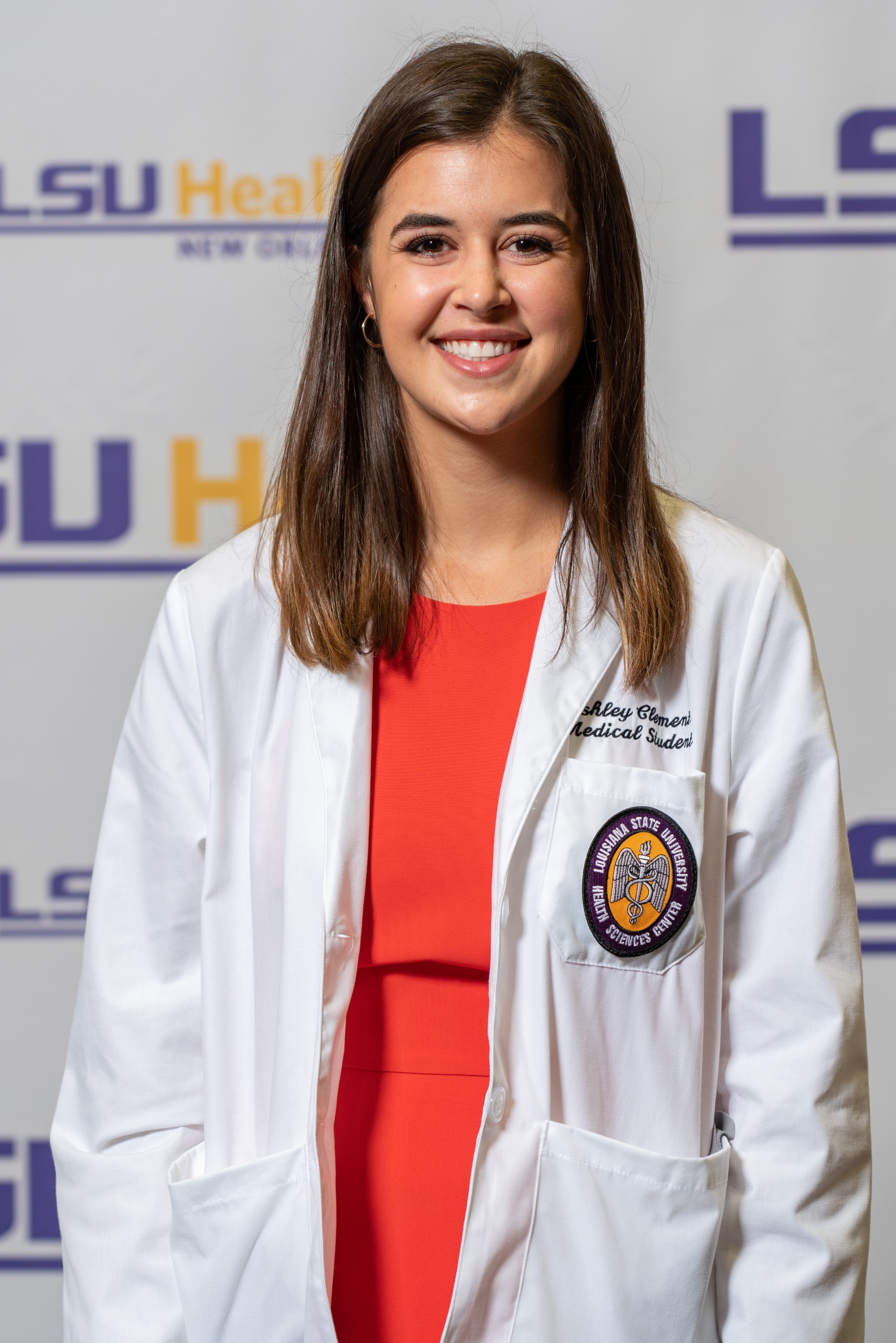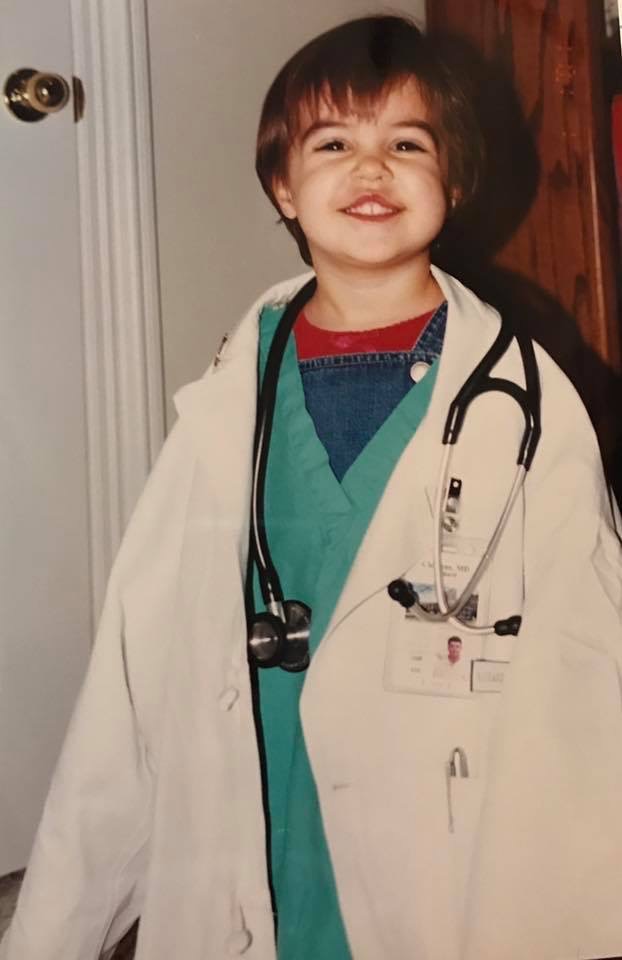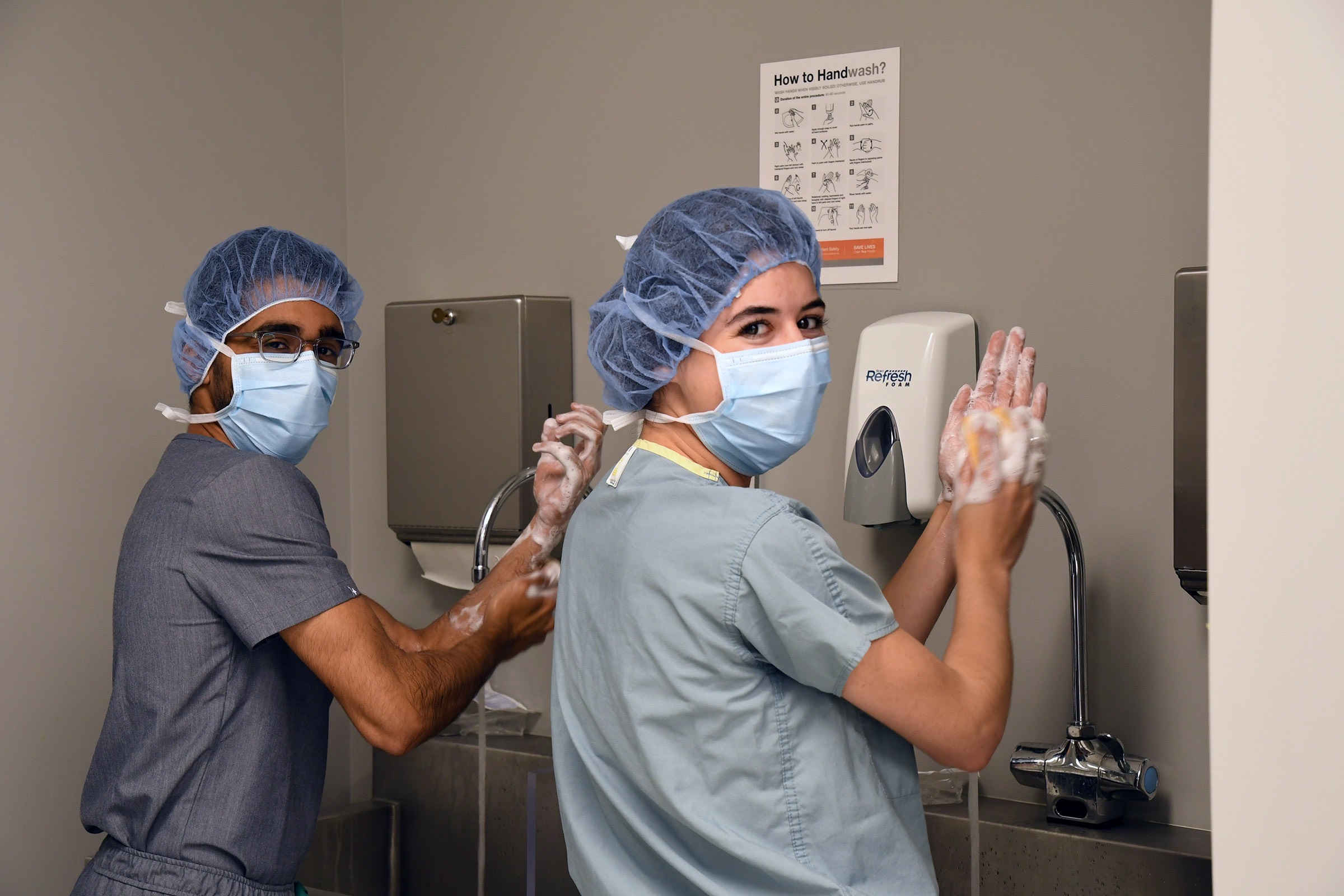Spotlight: Ashley Clement
May 01, 2023
Name: Ashley Clement
Graduation Year: 2020
Degree: Biological Sciences, Concentration in Secondary Education
Career:
- 4th Year Medical Student at LSU School of Medicine in New Orleans

Ashley Clement, GeauxTeach STEM Alumni, pictured at her white coat ceremony.
Q: What do you do in your current position, and what makes you happy to be doing it?
- I didn't realize how different [the years of medical school] were going to be. Your first 2 years are pretty much a classroom style learning. Your first year is like very basic sciences; it’s very textbook knowledge focused. When you're taking those classes, you’re going to class, going home, and studying…for 8-10 hours day. Your second year you get more exposure to the hospital and feel like, ‘Oh, wow! This is really fun!’, and you get more exposure each year. Your second year is more like disease processes, based on the basic sciences, and in your third year, you're in the hospital and seeing patients but also taking exams at the same time. In your third year, you get to see every different specialty…You rotate through every specialty. It's really great. It was super fun. That was like my favorite year…every year is your favorite year until you get to the next one. You’re like, ‘Oh, this is my favorite year, and this is way better than last year!’
- I'm really excited for [my fourth year] because now that we've rotated through everything, you pick your specialty that you want to do, and you create your own schedule. I want to specialize in OB . So, I'm doing some maternal fetal medicine rotations, some labor and delivery rotations, some night shift rotations working on labor and delivery, some ICU rotations which I really enjoy, and urogynecology rotations. All of which are subspecialties of the OBGYN field. I'm getting to really dive into the field that I'm most interested in…I’m really excited to be able to do everything that I chose to do. [An added bonus of applying for residencies, also known as The Match,] I get to go visit different programs outside of LSU, travel around the country, and go see what other programs are like.
Q: What are some highlights that you have experienced in your career?
- My highlights since graduating have been in this past year. I've gotten to actually use everything I've learned thus far and see patients. It's been my favorite thing. It made all the studying worth it. The studying is very hard and long, but getting to see patients, communicate with them, talk to them about their diseases, and use all the knowledge that I've been studying has definitely made everything worth it.
- Yeah, I think honestly, [my highlights are in] the small moments with patients. I used to think I wanted to do surgery, do all these very cool things, but I found a lot of reward in the small moments with a clinic patient, you know, explaining to them how a drug works/how they're supposed to take it. Sometimes as a student, you get extra time with the patient because the residents and attending will be very busy. We get to explain to them how their disease was affecting all these things that they didn't think were contributing to their disease, and [we] actually get to hang back and explain it to them; [For instance, I get to say], ‘This is why you're getting this symptom because we didn't take this medication.’ Getting to see [the patient realize], ’Oh yeah, I understand why if I don't take my Lasix, my feet swell.’ is really cool because you get to use the things that you've learned to be able to really impact somebody's health.

Being a doctor has always been in Ashley's future!
Q: What were the most significant takeaways or benefits you gained during your undergraduate experience?
- In my transition from premed to medical school, I think I had a big transition in my learning style; the volume [of material] was so much more in medical school than I ever anticipated…I felt like I had a good background from my undergrad experience of learning about how to learn…Because I was able to adapt and understood different methods of learning, I was able to try out different things and find something that worked for me. As an undergrad, I was doing not as much meta-cognition and was able to make flashcards/do like things to test myself. Whereas now in medical school, I can't. You cannot make 1 million flash cards for a test. You have to be able to read something/listen to something and understand it…You have to do more filtering of, ‘This is what I understand. This is what I don't understand.’…I don't care if anyone else knows this, but I failed my first 2 exams of medical school so terribly, like literally just got a complete F, and I had to completely change everything. Then, I was able to pull off A's in both of those classes. But I had to completely change. It was a shock going from straight A’s in undergrad to making an F in medical school. That was like my first F ever.
- Another thing I didn't anticipate in medicine was how the hierarchy of everything works. You have one person above you who is, you know, responsible for you, and your training, and then you may have somebody below you, and you're responsible for them…I always expected more of a classroom style of learning. But I've also had to transition to thinking there might be a younger person with me/rotating with me for the day, and I'm like, ‘Oh, wait! I have to be the teacher for this person, like I have to explain to them what I know.’ I'm not expected to teach them everything, but I'm expected to [help]…The person above me is expected to train me and ask me questions throughout the day, and I didn't really realize how much learning goes on. I thought maybe once you're an experienced doctor, you would expect to be a teacher, but you're expected to do that throughout your whole medical career. There's always someone below you that you can tell them what you know and share your knowledge.
Q: What did you learn in GeauxTeach STEM that informs how you think about teaching or how you approach your job? What skills did you learn in GeauxTeach STEM that have benefited you in your career?
- I think doing the GeauxTeach program was really valuable to me because I'm still using GeauxTeach on my resume while applying for Residency. For our application for medical for Residency, we get to pick 10 things throughout our entire career that you want to tell them. That's all you get. You don't send anything else. GeauxTeach is one of my 10 things. It makes you a really diverse applicant because academic institutions love that you had a secondary career/are able to communicate. I felt like that was a really valuable thing for me to do in undergrad, not really realizing how much it would pay off in medical school.
- You may have somebody younger than you that you have to teach, and you have to use the skills that a teacher has; you have to be able to look at people's faces and know if they understood you or not…I think not every science person in medical school does that…All those teacher things [I learned], I can use with my patients, and I didn't realize how much I would use that.

Ashley Clement learning how to "scrub in" for surgery.
Q: Is there anything else you would like to share with us?
If I met a premed student that wanted to go to medical school, I would definitely encourage them to do GeauxTeach. I think it really has impacted me a lot in my career more than I thought it would. It was something I kind of decided to do on a whim. I wasn't really sure what I was getting myself into. I took my first GeauxTeach class, and I would really encourage somebody else to do it…
When I knew I wanted to go to medical school, I didn't know when I was gonna get in, and I think getting in on the first try very easily could not have happened to me. And, I kind of had the fear of like…'What am I going to do for a year to try and get into medical school?' [GeauxTeach] gave me a whole other career opportunity, and it's still something that I think about after retiring from medicine. I've thought about going back into the classroom and teaching because I really enjoyed it. You know medicine is my passion, but I really do enjoy teaching, too. I like getting to teach people in the medical field, but I think it's something that I want to retire and do as well. So, I just encourage everyone to at least try the GeauxTeach program because it really made a large difference in my career.